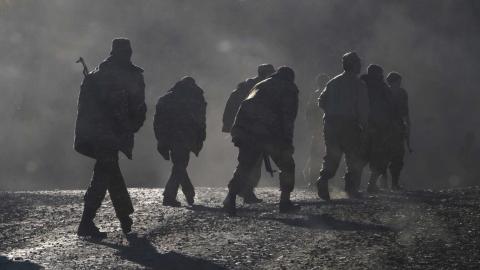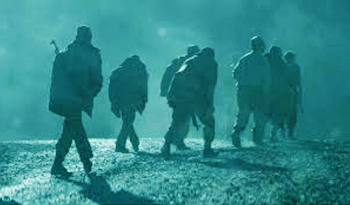
‘Sobering’: Horrors, Persecution Fears Leave Armenian Christians Feeling ‘Abandoned’ by Believers Around the World
BILLY HALLOWELL 05-07-2023
With the ongoing blockade in Nagorno-Karabakh, a small, landlocked region between Armenia and Azerbaijan, stretching into its fifth month, a persecution watchdog is warning of dire conditions.
Joel Veldkamp, head of international communications at persecution watchdog Christian Solidarity International (CSI), told CBN’s Faithwire he recently visited Armenia and collected firsthand stories from those experiencing the human catastrophe.
“It was really sobering,” Veldkamp said of his trip. “We got to go to almost the very south of the country, and we were able to drive right up to the beginning of the road that’s been blockaded by Azerbaijani soldiers, so we could see the road stretching off into the distance, empty [and] no traffic going along it.”
The blockage of the Lachin corridor, which began Dec. 12 and has persisted despite international condemnation, took form when individuals identifying as Azerbaijani protestors reportedly blocked the road, preventing food, medicine, and essential transport in or out of the Nagorno-Karabakh region.
Problems between Armenia and Azerbaijan have historic roots, with the blockage becoming the latest rift over the disputed Nagorno-Karabakh territory, considered by Armenian Christians to be their homeland.
Veldkamp said he met with Armenian Christian families who were forced to flee their homes three years ago when Azerbaijan “attacked their homeland.”
“They’re living … now as displaced people,” he said, noting the situation remains tense. “The Armenians feel very alone and very forgotten. They’re seeing that Azerbaijan, this really dreadful dictatorship that stirs up hatred against them — racial hatred, religious hatred — is able to do pretty much anything that it wants.”
Veldkamp said Armenian Christians in Nagorno-Karabakh are plagued by uncertainty, unsure of whether they will be able to remain in their homeland or if their nation will survive.
“To hear Armenians say, ‘We feel so abandoned by the Christian world. … Why is the church not paying any attention to what’s happening to us now’ — it was very sobering.”
Veldkamp said some Armenians have found “ways around the blockade” and have been able to get supplies from the Red Cross, though the situation remains “pretty bad.”
“They’re starting to plant crops again, but, as they find a way around, Azerbaijan responds,” he said, noting it’s virtually impossible to bring food in and quite difficult to plant it. “So, we’ve seen a whole lot of sniper attacks on farmers who are trying to grow food inside the blockaded region.”
Medical treatment, including necessary surgeries, also continues to be problematic due to the blockade. Veldkamp shared the story of a woman in the last stages of her pregnancy and a 9-year-old with leukemia, alleging both were declined passage.
“The local health authorities in the blockaded region have postponed over a thousand surgeries because they just don’t have the medicines that they need to perform these surgeries safely,” he said. “And we just got word … that the pressure is now so great, they’re going to restart the surgeries, because these people can’t wait anymore and they’re just kind of hoping that the medical supplies will hold out long enough for a change in the situation.”
As CBN News has extensively covered, the crisis in Nagorno-Karabakh has created unsustainable problems for Armenians. Gev Iskajyan, executive director of ANC-Artsakh, sounded the alarm about the ongoing crisis in February, detailing the desperation.
“Over 120,000 ethnic Armenians rely on that road [for] food, medicine, even energy and other vital supplies, necessities that the population needs to survive,” he said. “And that’s been essentially shut down.”
The conflict between Azerbaijan and Armenia over the land has deep, decades-long roots, which you can read about here.
Please pray for Armenian Christians
